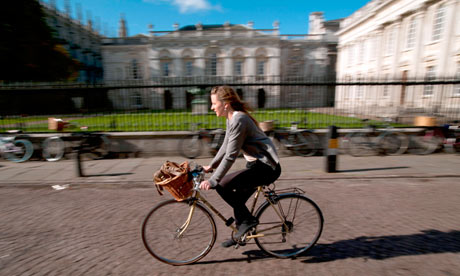There is statistical data to show that the height of Indian children is correlated to their and their neighbourhood’s access to toilets
You can learn a lot from measuring children’s height. How tall a child has grown by the time she is a few years old is one of the most important indicators of her well-being. This is not because height is important in itself, but because height reflects a child’s early-life health, absorbed nutrition and experience of disease.
Because health problems that prevent children from growing tall also prevent them from growing into healthy, productive, smart adults, height predicts adult mortality, economic outcomes and cognitive achievement. The first few years of life have critical life-long consequences. Physical or cognitive development that does not happen in these first years is unlikely to be made up later.
So it is entirely appropriate that news reports in India frequently mention child stunting or malnutrition. Indian children are among the shortest in the world. Such widespread stunting is both an emergency for human welfare and a puzzle.
Why are Indian children so short? Stunting is often considered an indicator of “malnutrition,” which sometimes suggests that the problem is that children don’t have enough food. Although it is surely a tragedy that so many people in India are hungry, and it is certainly the case that many families follow poor infant feeding practices, food appears to be unable to explain away the puzzle of Indian stunting.
‘ASIAN ENIGMA’
One difficult fact to explain is that children in India are shorter, on average, than children in Africa, even though people are poorer, on average, in Africa. This surprising fact has been called the “Asian enigma.” The enigma is not resolved by genetic differences between the Indian population and others. Babies adopted very early in life from India into developing countries grow much taller. Indeed, history is full of examples of populations that were deemed genetically short but eventually grew as tall as any other when the environment improved.
So, what input into child health and growth is especially poor in India? One answer that I explore in a recent research paper is widespread open defecation, without using a toilet or latrine. Faeces contain germs that, when released into the environment, make their way onto children’s fingers and feet, into their food and water, and wherever flies take them. Exposure to these germs not only gives children diarrhoea, but over the long term, also can cause changes in the tissues of their intestines that prevent the absorption and use of nutrients in food, even when the child does not seem sick.
More than half of all people in the world who defecate in the open live in India. According to the 2011 Indian census, 53 per cent of households do not use any kind of toilet or latrine. This essentially matches the 55 per cent found by the National Family Health Survey in 2005.
Open defecation is not so common elsewhere. The list of African countries with lower percentage rates of open defecation than India includes Angola, Burundi, Cameroon, Democratic Republic of the Congo, Ethiopia, Ghana, Kenya, Liberia, Malawi, Rwanda, Senegal, Sierra Leone, South Africa, Tanzania, Uganda, Zambia, and more. In 2008, only 32 per cent of Nigerians defecated in the open; in 2005, only 30 per cent of people in Zimbabwe did. No country measured in the last 10 years has a higher rate of open defecation than Bihar. Twelve per cent of all people worldwide who openly defecate live in Uttar Pradesh.
So, can high rates of open defecation in India statistically account for high rates of stunting? Yes, according to data from the highly-regarded Demographic and Health Surveys, an international effort to collect comparable health data in poor and middle-income countries.
International differences in open defecation can statistically account for over half of the variation across countries in child height. Indeed, once open defecation is taken into consideration, Indian stunting is not exceptional at all: Indian children are just about exactly as short as would be expected given sanitation here and the international trend. In contrast, although it is only one example, open defecation is much less common in China, where children are much taller than in India.
Further analysis in the paper suggests that the association between child height and open defecation is not merely due to some other coincidental factor. It is not accounted for by GDP or differences in food availability, governance, female literacy, breastfeeding, immunisation, or other forms of infrastructure such as availability of water or electrification. Because changes over time within countries have an effect on height similar to the effect of differences across countries, it is safe to conclude that the effect is not a coincidental reflection of fixed genetic or cultural differences. I do not have space here to report all of the details of the study, nor to properly acknowledge the many other scholars whose work I draw upon; I hope interested readers will download the full paper at http://goo.gl/PFy43.
DOUBLE THREAT
Of course, poor sanitation is not the only threat to Indian children’s health, nor the only cause of stunting. Sadly, height reflects many dimensions of inequality within India: caste, birth order, women’s status. But evidence suggests that socially privileged and disadvantaged children alike are shorter than they would be in the absence of open defecation.
Indeed, the situation is even worse for Indian children than the simple percentage rate of open defecation suggests. Living near neighbours who defecate outside is more threatening than living in the same country as people who openly defecate but live far away. This means that height is even more strongly associated with the density of open defecation: the average number of people per square kilometre who do not use latrines. Thus, stunting among Indian children is no surprise: they face a double threat of widespread open defecation and high population density.
The importance of population density demonstrates a simple fact: Open defecation is everybody’s problem. It is the quintessential “public bad” with negative spillover effects even on households that do not practise it. Even the richest 2.5 per cent of children — all in urban households with educated mothers and indoor toilets — are shorter, on average, than healthy norms recommend. They do not openly defecate, but some of their neighbours do. These privileged children are almost exactly as short as children in other countries who are exposed to a similar amount of nearby open defecation.
If open defecation indeed causes stunting in India, then sanitation reflects an emergency not only for health, but also for the economy. After all, stunted children grow into less productive adults.
It is time for communities, leaders, and organisations throughout India to make eliminating open defecation a top priority. This means much more than merely building latrines; it means achieving widespread latrine use. Latrines only make people healthier if they are used for defecation. They do not if they are used to store tools or grain, or provide homes for the family goats, or are taken apart for their building materials. Any response to open defecation must take seriously the thousands of publicly funded latrines that sit unused (at least as toilets) in rural India. Perhaps surprisingly, giving people latrines is not enough.
Ending a behaviour as widespread as open defecation is an immense task. To its considerable credit, the Indian government has committed itself to the work, and has been increasing funding for sanitation. Such a big job will depend on the collaboration of many people, and the solutions that work in different places may prove complex. The assistant responsible for rural sanitation at your local Block Development Office may well have one of the most important jobs in India. Any progress he makes could be a step towards taller children — who become healthier adults and a more productive workforce.




